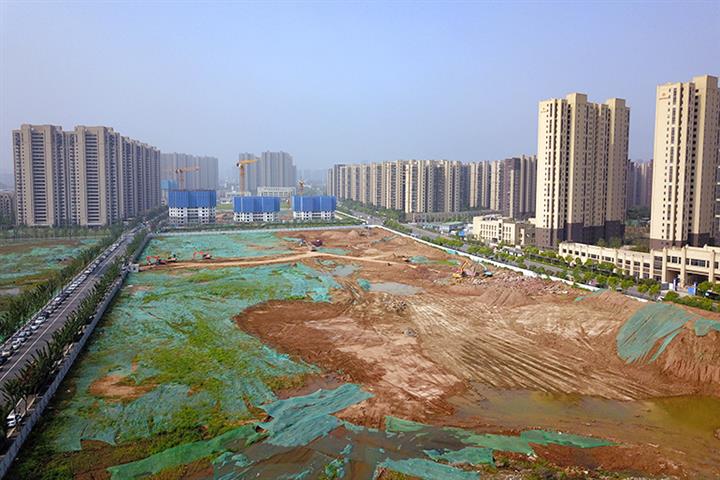 China’s Local Govts Need New Sources of Revenue as Land Use Payments Slump 31%
China’s Local Govts Need New Sources of Revenue as Land Use Payments Slump 31%(Yicai Global) Jan. 10 -- China’s property market contraction has dealt a heavy blow to local government finances, with payments from land transactions falling 31 percent to CNY4.73 trillion (USD697.3 billion) in 2022. Insiders said the only way to bridge the gap in the short term will be to stabilize the real estate market, but in the medium and long term, new sources of revenue will have to be found.
Payments from land transactions refers to the revenue local governments pocket from selling the rights to use land and it is one of their main sources of income. According to Yicai Global’s calculations, land transaction payments have accounted for over 30 percent of total local government fiscal revenue for five straight years since 2017, and the ratio was over 40 percent in 2020 and 2021.
Last year, there was widespread anger and controversy about the failure to complete and deliver homes people had already paid for, and combined with pessimism about people’s income expectations, new home sales fell. Property developers had been actively buying land use rights early in 2022, but demand tailed off notably after that, Zhang Kai, head of the land affairs division at the China Index Academy, said in an interview with Yicai Global.
It will take time for the gloom about people’s income expectations to disperse, so the weak prospects for housing prices will not change in the near future, Zhang said, adding that the short-term transaction volume of new properties will not see a big improvement this year, and nor will revenue from land sales.
Slowing Urbanization
Another problem is the fact that China’s urbanization rate is slowing, Zhang said, with an aging population and slower birthrate having a negative impact on housing demand. That means a gradual drop in the overall number of property market transactions is inevitable.
At present, demand and purchasing capacity are stretched in about 80 percent of Chinese cities, a research report from the CRIC Research Center showed, with nearly half of the cities having excessive supplies of land.
The gradual reduction in future earnings from land sales has been an unarguable fact for some time. It means that the continued reliance of local governments on this income for their fiscal revenue is unsustainable, and the need to find new revenue growth points has become a pressing issue.
Property Tax
In future, finding stable sources of fiscal revenue for local governments will be extremely important, noted Luo Zhiheng, deputy head of Yuekai Securities’ research institute, adding that levying a real estate tax will be an important trend. However, revenue from such a tax cannot replace that from land transactions in the short run.
Zhang also said real estate tax could be a long-term and stable source of revenue. Given the rapid growth there has been in the property sector over the last two decades, there are plenty of existing homes that are taxable, and this could help close the fiscal gap in the long term.
If there were a 1 percentage point rise in the rate of return on state-owned enterprises’ total assets, which are worth around CNY300 trillion (USD44.3 trillion), earnings would increase by CNY3 trillion, Li Xunlei, chief economist at Zhongtai Securities, noted in a recent article. Such earnings could basically fill the fiscal gap caused by the drop in revenue from land sales, if they were disbursed to local governments.
But these measures cannot be accomplished in the near term. The CRIC Research Center said the current focus should be on boosting market confidence, improving the mechanism for ensuring home deliveries, guaranteeing employment and maintaining house prices, which will ease the market’s wait-and-see sentiment. Relaxing restrictions on purchasing, loans, and sales would also help, it said, adding that China needs to adjust the land supply structure.
Editors: Xu Wei, Tom Litting